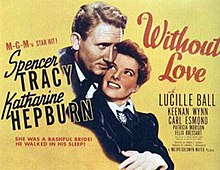Without Love (film)
| Without Love | |
|---|---|

Theatrical release poster
|
|
| Directed by | Harold S. Bucquet |
| Produced by | Lawrence Weingarten |
| Written by |
Philip Barry (play) Donald Ogden Stewart |
| Starring |
Spencer Tracy (film) Katharine Hepburn Elliott Nugent (play) |
| Music by | Bronislau Kaper |
| Cinematography | Karl Freund |
| Edited by | Frank Sullivan |
| Distributed by | Metro-Goldwyn-Mayer |
|
Release date
|
|
|
Running time
|
111 minutes |
| Country | United States |
| Language | English |
| Budget | $1,813,000 |
| Box office | $3,784,000 |
Without Love is a 1942 play by Philip Barry, later made into a 1945 romantic comedy film starring Spencer Tracy and Katharine Hepburn. The film was directed by Harold S. Bucquet from a screenplay by Donald Ogden Stewart based on the Barry play. Lucille Ball also stars in the film.
Lonely widow Jamie Rowan (Katharine Hepburn) helps the war effort by marrying a military research scientist, Patrick Jamieson (Spencer Tracy on film, Elliott Nugent on the stage), who has set up his lab in her house in Washington, D.C. Patrick has had all the worst of love and Jamie, all the best. They both believe that a marriage could be a success without love, as it reduces the chances of jealousy and bickering and all the other marital disadvantages. But as the film progresses, the inevitable happens as they begin to fall in love with each other.
In the movie, Jamie's house is at 481 Connecticut Avenue, N.W. In real life there is no 481 Connecticut Avenue, N.W. in D.C. Connecticut Avenue begins at the 800 block. If Connecticut Avenue were extended further south, 481 would be near the Ellipse Visitor Pavilion.
The original Philip Barry stage play debuted on Broadway at the St. James Theatre in 1942. Katharine Hepburn starred as Jamie Rowan with actor/writer/director Elliott Nugent as Patrick Jamieson, the role Spencer Tracy would take in the film. Audrey Christie played the Lucille Ball role of Kitty Trimble, and the cast included Royal Beal and Lauren Gilbert.
Barry wrote the part expressly for Hepburn, as he had previously done with The Philadelphia Story, a major Broadway hit for Hepburn which she turned into her 1940 comeback film, also starring Cary Grant and James Stewart, and also adapted for the screen by Donald Ogden Stewart. Hepburn and Grant's 1938 film Holiday—which had already been a 1930 film—was based on a 1929 Barry play.
...
Wikipedia
